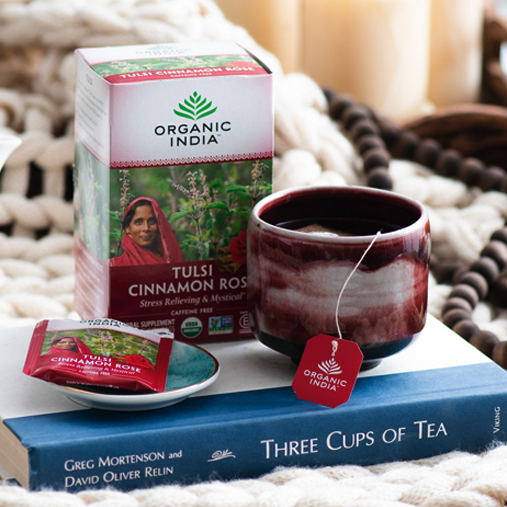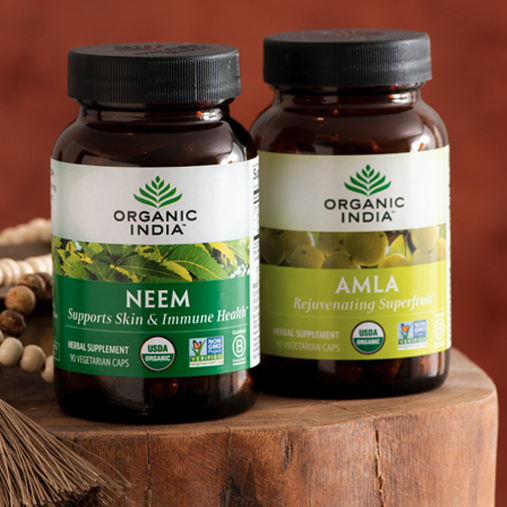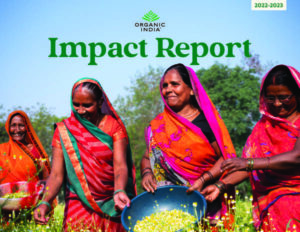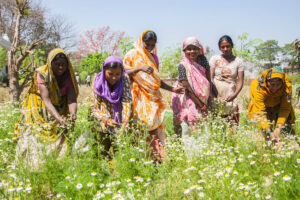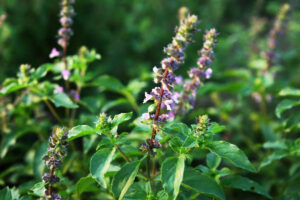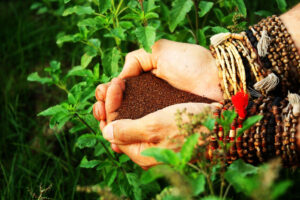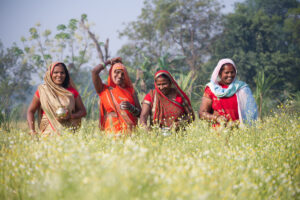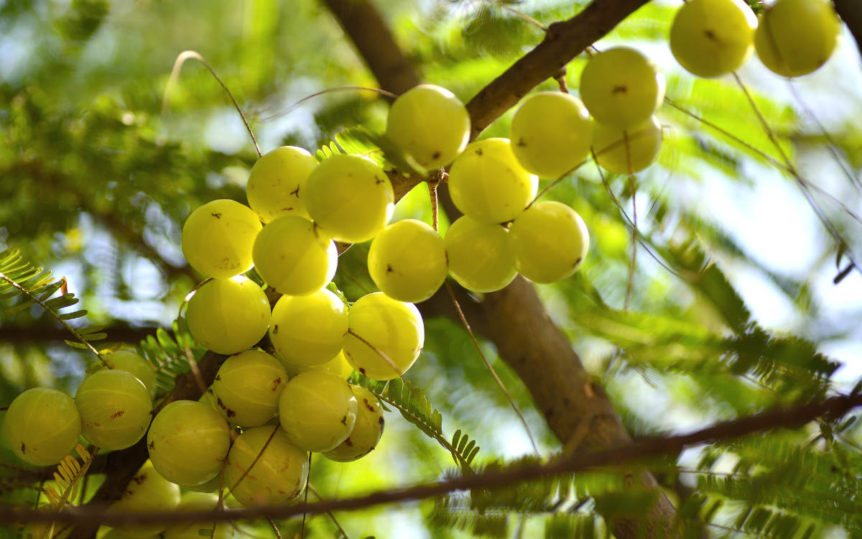Back
From out of the subtropical regions of India comes Amla, a plant whose berries are among the richest natural sources of Vitamin C. Amla, also known as Amalaki, is noted throughout ancient texts, and is described in Ayurvedic scriptures, Indian folklore and Sanskrit works — all of which laud the fruit’s ability to address a wide range of health issues. Then and now, people have used Amla for immune system support.
Does Amla Boost Immunity?
Yes, according to studies published in the U.S. National Library of Medicine, amla has immunomodulatory effects. The effects are found to be due to its antioxidant properties, which not only help support immunity, but create an anti-apoptotic effect that protects against cell damage and oxidative stress.
While western science shows that amla’s health benefits derive from the plant’s rich stores of antioxidants and Vitamin C, Ayurvedic practitioners use the plant’s entire complex of entwined nutrients for immune support and beyond. In Ayurveda, amla is an exceptionally important rejuvenating fruit used to support blood, bones, liver, and heart health, as well as imbalances of one’s particular dosha that contribute to such issues. Amla is commonly used to increase the Ojas, which is one of the three vital essences that join to promote vitality, clarity, and overall health.
Historic Use of Amla for Immunity
Amla has its origins in the Hindi word for the amla fruit tree, which means “sour.” The tree, now known by its Latin names Emblica officinalis and Phyllanthus emblica, grows throughout India and bears sour-tasting fruits. In Sanskrit, Amla is called “Amalaki.” Other Sanskrit nicknames describe amla as “mother,” “nurse,” and “immortality” — all of which are a testament to its healing and nurturing qualities.
Adhiyaman, a princely figure in Tamil literature known for his generosity, is said to have given a rare gooseberry imbued with the power to grant longevity to the great poet Avvaiyar, to promote literature. Sushruta (7th century BCE), India’s father of ancient medicine, also wrote of amla’s invigorating health benefits. Since the earliest days of healing, the fruit has been a staple of Ayurvedic healthcare. Today, it is studied by medical researchers for its healing properties, and especially for its unique support of the immune system.
Amla for Immune System Support
In the science of immunology, the immune system is divided into a two major categories. Innate immunity is the first line of defense that protects the body from the outside world, including physical barriers and non-specific immune cells. Examples include the skin; mucous linings of nose, mouth, sinuses, digestive tract; perspiration and tears, and cells that come to the site of infection, disease, and invasion as they create a barrier to further intrusion into tissues and other cells.
Humoral immunity is also called adaptive immunity and is activated when a foreign pathogen or antigen gets past innate immune barriers. The adaptive immune system includes specialized, systemic cells and processes that eliminate pathogens by preventing their growth. You can try this Chyawanprash-Inspired Amla Jam to enjoy the fruit’s immune-supporting benefits.
Although amla benefits all three doshas (body types) — Pitta, Kapha, Vata — Ayurvedic practitioners use the plant as a potent adaptogen, or Rasayana for Pitta types.
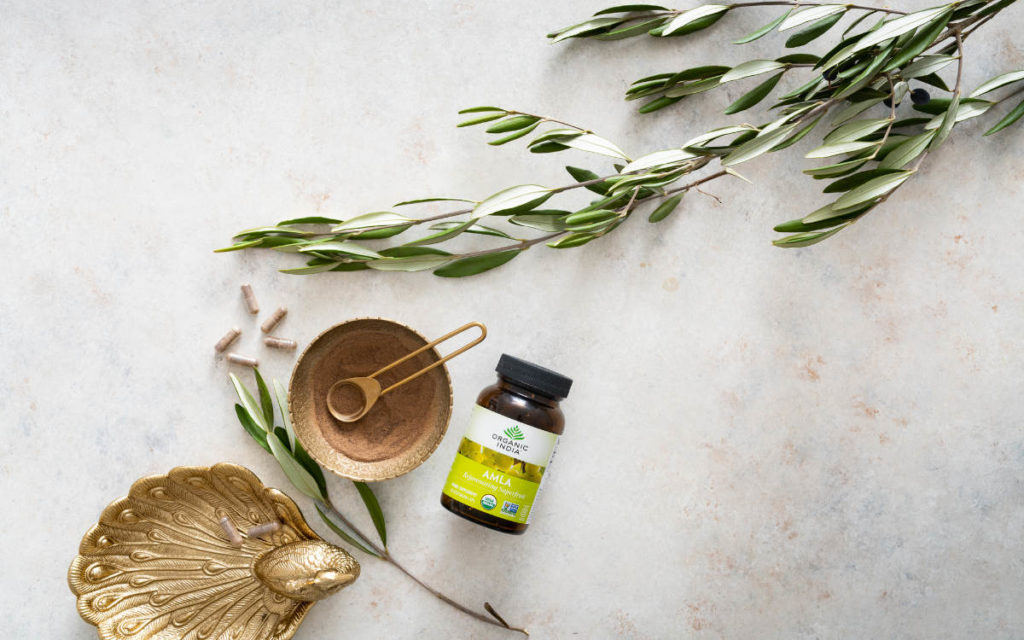
Amla’s Vitamin C Content
Vitamin C is the predominant vitamin complex of amla, with the fruit pulp containing 20 times more Vitamin C content than an orange. The Vitamin C complex and its cofactors (helper nutrients) that are innate within fruits, vegetables, and berries, work together to provide innate immunity. Vitamin C protects cell linings, which, at least in part, explains how amla supports the integrity and function of all the cells, tissues, and organs involved in the immune system. When the cellular linings of the lungs are strong, for example, the intake of healing oxygen is robust, and the toxic substances can be breathed out of the body.
Amla provides the nutrients that, according to scientific research, support cellular functions of the entire immune system: Vitamin C supports the skin to protect against oxidative stress (the loss of oxygen due to oxygen-robbing free radical molecules from environmental toxins, artificial food ingredients, and natural bodily metabolism). Vitamin C enables phagocytic cells to ingest and destroy foreign particles, bacteria, and cell debris). And, Vitamin C and its helper nutrients are needed for apoptosis, which is the natural death of cells, as well as the removal of these cells. Clearly, Vitamin C deficiency leads to impaired immunity and higher susceptibility to infections.
Amla and Ayurveda
As a whole, integrated plant, amla is an Ayurvedic gem. Jagdev Singh, Ayurvedic herbalist, wrote that, besides vitamin C, the fruit is also a rich source of polyphenols that possess antioxidant properties. This combination of Vitamin C and polyphenols help fight oxidative stress (cell damage from loss of oxygen), modulate the immune system, and keep diseases and disorders at bay.
Because Ayurveda takes a holistic approach to healthcare that involves the mind, body, emotions, and spirit, amla defends against illness by addressing issues such as anxiety, depression, agitation, insomnia, and irritability. The Vitamin C content of amla also supports the adrenal glands, which are needed to face stress — especially the kind that is connected to trauma and the fight-or-flight reaction in the face of immediate or chronic threats, whether physical or emotional in nature. Because the adrenal glands are involved in energy production and require Vitamin C for healthy function, having adequate energy levels are needed to ward off disease and meet the stressors of day-to-day life.
An Adaptogen for the Doshas
Adaptogens are generally regarded for their impressive ability to reduce stress, but they are capable of far more. Although amla benefits all three doshas (body types) — Pitta, Kapha, Vata — Ayurvedic practitioners use the plant as a potent adaptogen, or Rasayana for Pitta types.
Researchers for the Women in Balance Institute explain that adaptogenic herbs work on the physical, mental, and emotional states of the body. Adaptogens work because they have an affinity for the entire body, not just one of its systems. They provide the vitamins, minerals, and phytochemicals the body needs to adapt to its ever-challenging environment, but they also offer natural synchronistic nutrients and energies that are not reproducible by science and are needed for health, healing, and recovery from illness. Among fruits and vegetables, amla is a powerhouse of healing and prevention, which is why Ayurvedic doctors have been recommending it for thousands of years.
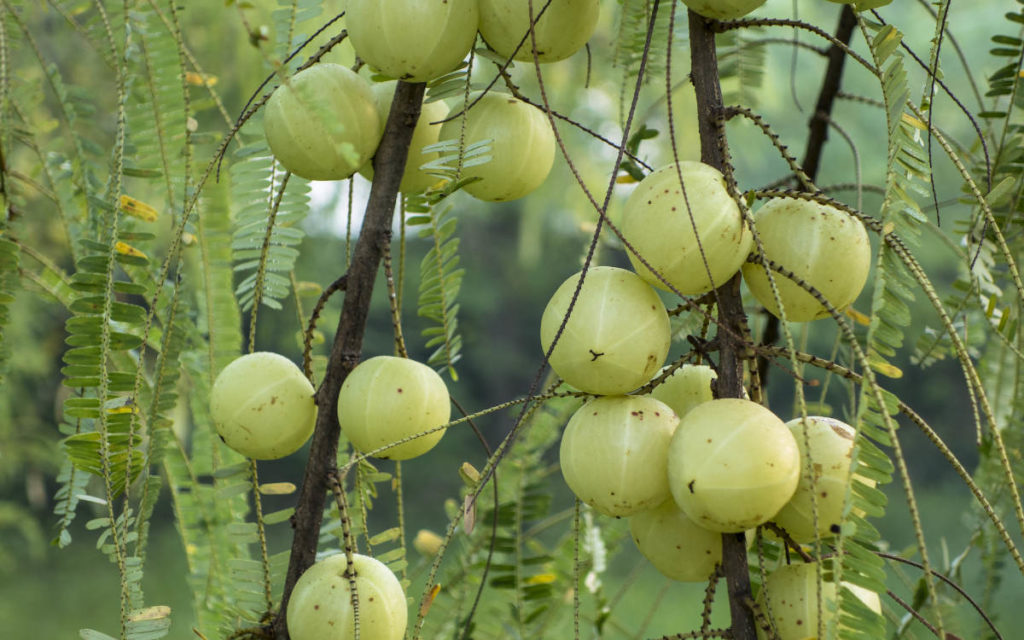
Did you know Amla is also good for skin health? Check out this DIY Amla Facial Mask.

